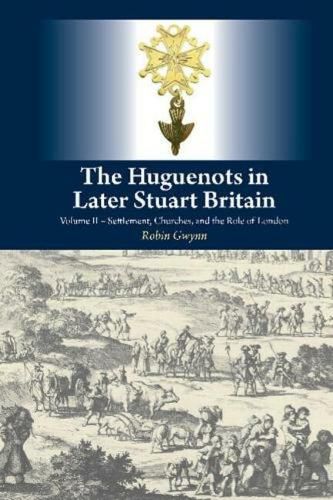Readings Newsletter
Become a Readings Member to make your shopping experience even easier.
Sign in or sign up for free!
You’re not far away from qualifying for FREE standard shipping within Australia
You’ve qualified for FREE standard shipping within Australia
The cart is loading…






The Huguenots in Later Stuart Britain is planned as one work to be published in three interlinking volumes (titles/publication dates detailed below). It examines the history of the French communities in Britain from the Civil War, which plunged them into turmoil, to the Treaty of Utrecht in 1713, after which there was no realistic possibility that the Huguenots would be readmitted to France. There is a particular focus on the decades of the 1680s and 1690s, at once the most complex, the most crucial, and the most challenging alike for the refugees themselves and for subsequent historians. This volume explains when refugees fled France, and what drove them to settle in some regions of Britain but not others. Recent scholarship has lowered former estimates of refugee numbers across Europe, but careful analysis of the available evidence suggests that for Britain, previous estimates have been low and need upward revision. European historians have accepted Pierre Bayles assertion that the Netherlands were the great ark of the refugees too uncritically. While Bayles remark was true enough when the Edict of Nantes was revoked in 1685, by 1700 England had emerged as the most significant refugee centre. In particular, London came to house by far the largest Huguenot community in exile, and the reasons for the capitals huge appeal are examined.
Historians have debated the reception that awaited the Huguenots in Britain. Were they warmly welcomed, sullenly accepted, or consciously opposed? The answer varied over time and place, but this book argues that overall they met an exceptionally sympathetic welcome. Part of the evidence lies in the extraordinary efforts made to give them economic support, involving the creation of a special administrative bureaucracy with a high-powered French Committee to administer relief funds under the supervision of an even higher-powered English Committee which audited its work. A chapter is devoted to the relief process. Appendices list all known lay officers of the French congregations and reproduce some little-known key documents. Volume I: Crisis, Renewal, and the Ministers Dilemma
978-1-84519-618-9 (2015); Volume III: The Huguenots and the Defeat of Louis XIVs France 978-1-84519-620-2 (2020)
$9.00 standard shipping within Australia
FREE standard shipping within Australia for orders over $100.00
Express & International shipping calculated at checkout
The Huguenots in Later Stuart Britain is planned as one work to be published in three interlinking volumes (titles/publication dates detailed below). It examines the history of the French communities in Britain from the Civil War, which plunged them into turmoil, to the Treaty of Utrecht in 1713, after which there was no realistic possibility that the Huguenots would be readmitted to France. There is a particular focus on the decades of the 1680s and 1690s, at once the most complex, the most crucial, and the most challenging alike for the refugees themselves and for subsequent historians. This volume explains when refugees fled France, and what drove them to settle in some regions of Britain but not others. Recent scholarship has lowered former estimates of refugee numbers across Europe, but careful analysis of the available evidence suggests that for Britain, previous estimates have been low and need upward revision. European historians have accepted Pierre Bayles assertion that the Netherlands were the great ark of the refugees too uncritically. While Bayles remark was true enough when the Edict of Nantes was revoked in 1685, by 1700 England had emerged as the most significant refugee centre. In particular, London came to house by far the largest Huguenot community in exile, and the reasons for the capitals huge appeal are examined.
Historians have debated the reception that awaited the Huguenots in Britain. Were they warmly welcomed, sullenly accepted, or consciously opposed? The answer varied over time and place, but this book argues that overall they met an exceptionally sympathetic welcome. Part of the evidence lies in the extraordinary efforts made to give them economic support, involving the creation of a special administrative bureaucracy with a high-powered French Committee to administer relief funds under the supervision of an even higher-powered English Committee which audited its work. A chapter is devoted to the relief process. Appendices list all known lay officers of the French congregations and reproduce some little-known key documents. Volume I: Crisis, Renewal, and the Ministers Dilemma
978-1-84519-618-9 (2015); Volume III: The Huguenots and the Defeat of Louis XIVs France 978-1-84519-620-2 (2020)